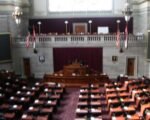In a recent statement, North Dakota’s Catholic bishops have urged the faithful to vote against a state ballot proposal that would legalize marijuana for recreational use. The bishops, citing concerns over the potential harm to individuals, families, and communities, emphasized the negative health impacts and social consequences of marijuana use. This call to action comes as North Dakota prepares to vote on Measure 5, which, if approved, would allow adults 21 and over to grow, sell, possess, and use marijuana recreationally. The bishops’ stance reflects a broader debate on the implications of marijuana legalization.

Health Risks and Moral Concerns
The bishops’ opposition is rooted in both health and moral concerns. They referenced the Catechism of the Catholic Church, which teaches that drug use inflicts grave damage on human health and life. Bishop David Kagan of Bismarck and Bishop John Folda of Fargo highlighted research showing that regular marijuana use impairs brain functioning, stunts brain development, and can damage the lungs and immune system. They also pointed out the association between marijuana use and mental health issues such as depression, anxiety, and suicide.
The bishops argue that marijuana is not the harmless drug some believe it to be. They stressed that its legalization could lead to increased use and subsequent health problems. Their statement also noted that marijuana can serve as a gateway to harder drugs, further exacerbating public health issues. This perspective aligns with concerns from other health professionals and organizations in the state.
In addition to health risks, the bishops raised moral objections to marijuana use. They believe that legalizing recreational marijuana would send the wrong message to young people and undermine efforts to promote healthy, drug-free lifestyles. The bishops’ stance is part of a broader moral and ethical debate on the role of drugs in society.
Economic and Social Implications
Beyond health and moral concerns, the bishops also addressed the economic and social implications of marijuana legalization. They argued that the potential economic benefits, such as tax revenue and job creation, do not outweigh the social costs. The bishops cited examples from other states where legalization has led to increased drug use, crime, and public health issues. They warned that North Dakota could face similar challenges if Measure 5 is approved.
The bishops also emphasized the importance of focusing on prevention, education, and treatment for substance use and mental health issues. They argued that resources should be directed toward these areas rather than legalizing another potentially harmful substance. This approach, they believe, would better serve the health and well-being of North Dakota’s communities.
Furthermore, the bishops highlighted the potential impact on law enforcement and public safety. They expressed concerns that legalization could strain law enforcement resources and lead to an increase in drug-related incidents. The bishops called for a comprehensive approach to addressing substance use that prioritizes prevention and support over legalization.
Community and Legislative Response
The bishops’ statement has sparked a range of responses from the community and lawmakers. Some support the bishops’ stance, agreeing that the risks of legalization outweigh the benefits. Others argue that legalization could provide economic opportunities and reduce the burden on the criminal justice system. The debate reflects broader national discussions on marijuana policy and its implications.
Lawmakers in North Dakota are also divided on the issue. Some have expressed support for Measure 5, citing the potential economic benefits and the need for a regulated market. Others share the bishops’ concerns and advocate for a more cautious approach. The upcoming vote on Measure 5 will be a critical moment in determining the future of marijuana policy in the state.
As the debate continues, the bishops remain steadfast in their opposition. They have called on Catholics and all people of good will to vote “no” on Measure 5, emphasizing the need to protect public health and safety. The outcome of the vote will have significant implications for North Dakota and could influence broader national trends in marijuana policy.
Jane Smith is a seasoned article writer specializing in cannabis-related content. With a keen focus on the latest trends, research, and developments in the cannabis industry, she brings a fresh perspective to her writing. Jane’s insightful articles delve into the medicinal benefits, legalization efforts, and evolving culture surrounding cannabis. Her engaging storytelling and informative approach make her a trusted source for readers seeking accurate and up-to-date information on all things cannabis.








